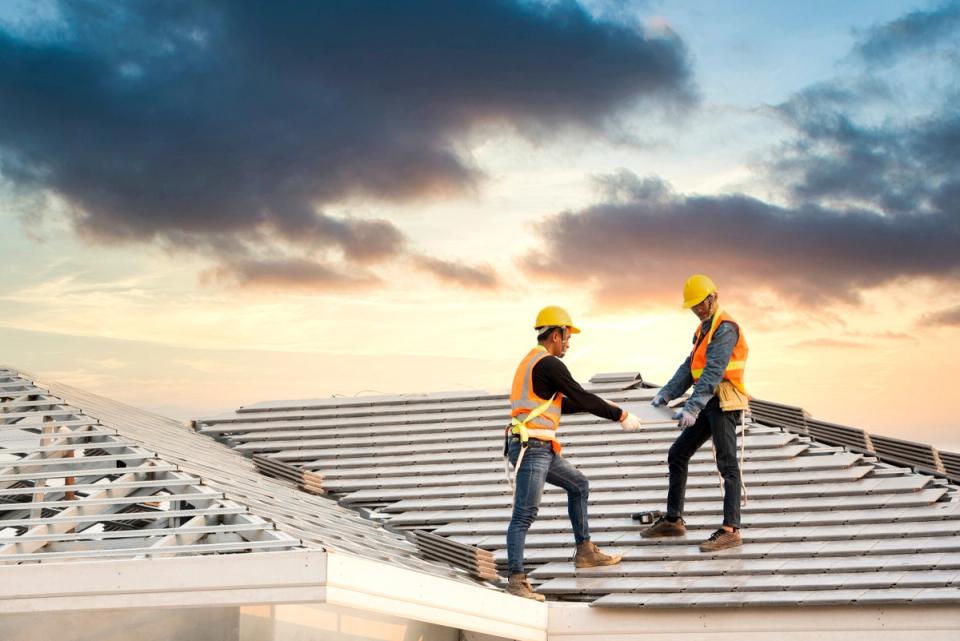
When replacing or installing a new roof, homeowners often choose between asphalt shingles and metal roofing. Each material has distinct advantages, and the best option depends on factors like budget, longevity, and climate. This guide outlines the benefits of both to help you make a strategic choice.
Why Invest in a New Roof?
A new roof enhances curb appeal, increases property value, improves energy efficiency, and provides better protection against the elements. If your roof is aging, leaking, or damaged, replacing it can prevent costly repairs. Some roofing materials also qualify for tax credits or insurance discounts, adding to their value.
Additionally, a new roof offers peace of mind, especially in areas prone to extreme weather. It can also boost resale value, as buyers often prioritize homes with recent upgrades, making it easier to sell.
Asphalt Shingles: Affordable and Reliable
Asphalt shingles are the most common roofing material in the U.S., covering nearly 80% of homes. They are made from a fiberglass base coated with asphalt and mineral granules, balancing durability and affordability.
Pros of Asphalt Shingles:
- Cost-Effective: Cheaper upfront than metal roofing, making them ideal for budget-conscious homeowners.
- Variety of Styles: Available in many colors and textures to match different home designs.
- Easy Installation: Lightweight and simple to install, reducing labor costs.
- Repair Simplicity: Damaged shingles can be replaced individually, keeping repair costs low.
- Widely Available: Commonly used, making it easy to find contractors and materials.
Cons of Asphalt Shingles:
- Shorter Lifespan: Typically lasts 15 to 30 years, less than metal roofing.
- Less Energy Efficient: Dark-colored shingles absorb heat, increasing cooling costs.
- Weather Vulnerability: High winds, hail, and extreme temperatures can shorten their lifespan.
- Environmental Impact: Not as easily recyclable as metal roofing, contributing to landfill waste.
Metal Roofing: Durable and Energy Efficient
Metal roofing is gaining popularity due to its longevity and energy efficiency. Made from aluminum, steel, copper, or zinc, metal roofs provide excellent durability and performance.
Pros of Metal Roofing:
- Long Lifespan: Can last 40 to 70 years, making it a cost-effective long-term option.
- Energy Efficiency: Reflective coatings reduce cooling costs by reflecting solar heat.
- Durability: Withstands extreme weather, including snow, strong winds, and hail.
- Low Maintenance: Resistant to mold, mildew, and rot, requiring minimal upkeep.
- Eco-Friendly: Often made from recycled materials and can be fully recycled at the end of their lifespan.
- Fire Resistance: Provides superior protection in wildfire-prone areas.
Cons of Metal Roofing:
- Higher Upfront Cost: More expensive initially, which may deter budget-conscious homeowners.
- Complex Installation: Requires specialized labor, increasing installation costs.
- Noise Factor: Rain or hail can create noticeable noise if not properly insulated.
- Denting Potential: Softer metals like aluminum and copper can dent from hail or falling branches.
- Expansion and Contraction: Metal expands and contracts with temperature changes, which may loosen fasteners over time if not installed correctly.
Cost Comparison: Asphalt vs. Metal Roofing
- Asphalt Shingles: $5,000 - $12,000 (materials and installation for an average-sized home)
- Metal Roofing: $10,000 - $30,000 (depending on material type and complexity)
Although asphalt shingles are cheaper upfront, metal roofing offers greater long-term savings through energy efficiency and lower maintenance costs. Many homeowners recoup their investment with reduced utility bills and fewer repairs over time.
Climate Considerations
Your location plays a key role in choosing the right roofing material. Metal roofs perform well in areas prone to hurricanes, wildfires, or heavy snow due to their durability. Conversely, asphalt shingles are sufficient in moderate climates and cost less initially.
For coastal regions, metal roofing is preferable due to its resistance to saltwater corrosion. In humid areas with heavy rain, asphalt shingles may degrade faster. If your region experiences extreme temperature shifts, metal’s expansion and contraction properties should be considered.
Which Roof Is Best for Your Home?
The best roofing material depends on your priorities:
- Choose Asphalt Shingles If: You have a limited budget, prefer traditional aesthetics, and live in a mild climate.
- Choose Metal Roofing If: You plan to stay in your home long-term, want energy savings, or live in an area with extreme weather.
Get Professional Quotes for Your Roofing Project
Before making a final decision, consult professional roofers for estimates and recommendations. Many offer free inspections and can guide you based on your home’s structure and climate. Be sure to ask about warranties, as some manufacturers provide extended coverage that protects your investment.
Look for contractors with strong reviews and proper certifications. A quality installation ensures your roof lasts as long as possible while performing efficiently.
Key Takeaways
Both asphalt and metal roofing have advantages, and the best choice depends on your budget, location, and long-term plans. Asphalt shingles are affordable and widely available, while metal roofing offers superior durability and energy savings. Understanding their differences will help you make a confident decision when requesting quotes and starting your roofing project.